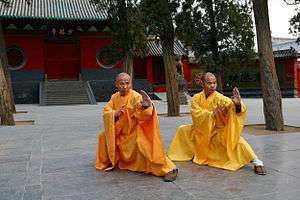Qinggong
Qinggong[1] is a technique in Chinese martial arts that is visually reminiscent of parkour, despite having different training methods.
| Part of a series on |
| Chinese martial arts (Wushu) |
|---|
 |
| Wushu in the world |
|
Historical locations
|
| Wushu athletes/practitioners |
|
Legendary figures
|
|
Historical individuals
|
|
Modern celebrities
|
| Wushu influence |
| Qinggong | |||||||||||||||
|---|---|---|---|---|---|---|---|---|---|---|---|---|---|---|---|
| Chinese name | |||||||||||||||
| Traditional Chinese | 輕功 | ||||||||||||||
| Simplified Chinese | 轻功 | ||||||||||||||
| Literal meaning | light skill | ||||||||||||||
| |||||||||||||||
| Vietnamese name | |||||||||||||||
| Vietnamese | Khinh công | ||||||||||||||
| Hán-Nôm | 輕功 | ||||||||||||||
| Japanese name | |||||||||||||||
| Kanji | 軽功 | ||||||||||||||
| Hiragana | けいこう | ||||||||||||||
Traditional Baguazhang training involves the use of qinggong. The practitioner runs up a plank supported against a wall. The gradient of the plank is increased gradually over time as the training progresses.[2]
It's a well-known fact that due to so many words in Chinese being similar in sound, especially if overlooking differences in tone, that puns play a significant role in choosing a name or term for certain things. While the characters used for this skill are 輕功 \ 轻功 (Trad.\ Simp.), where the meaning of the first character is light [in weight]; easy; soft; gentle, and the second means achievement; effort; skill; good result, since the training involves incrementally changing the slope or incline of a plank of wood used as a platform, there's a suggested pun with substituting 傾 \ 倾 (Trad.\ Simp.) for the first character, where its meaning is to overturn; to collapse; to lean; to incline. Note that both 輕 \ 轻 and 傾 \ 倾 are pronounced identically and even carry the same exact tone.
The use of qinggong has been exaggerated in wuxia fiction, in which martial artists have the ability to move swiftly and lightly at superhuman speed, and perform gravity-defying moves such as gliding on water surfaces, scaling high walls and mounting trees. In some wuxia and martial arts films containing elements of wire fu, qinggong stunts are simulated by actors and stunt performers suspending themselves from wires.[3]
See also
References
- Timofeevich, Andrew; Yiming Jin; Cuiya Guo (2007). Lian Gong Mi Jue: Secret Methods of Acquiring External and Internal Mastery. Lulu.com. ISBN 978-1-84753-371-5.
- Sun, Lutang; Tim Cartmell (2003). A Study of Taijiquan. North Atlantic Books. p. 25. ISBN 978-1-55643-462-4.
- Rahner, Mark (2004-12-24). "Wire-fu flicks: Pouncing public, hidden treasures". Seattle Times. Archived from the original on June 29, 2011. Retrieved 2010-12-17.